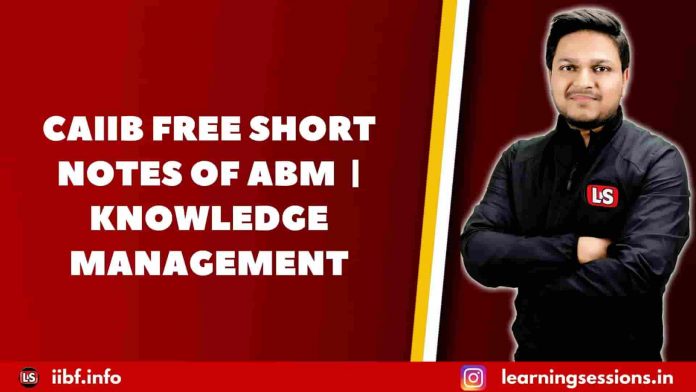CAIIB FREE SHORT NOTES OF ABM 2024 | KNOWLEDGE MANAGEMENT
In this article, you will know all about knowledge management as per the prescribed CAIIB syllabus 2024. You can find many others such as free short notes on CAIIB papers for the 2024 exam.
KNOWLEDGE MANAGEMENT
It is a process where businesses gather, organize, share and analyze the knowledge it has been so far in a way that can be easily accessed by their employees. This knowledge may be in the form of training documents, technical resources, frequently asked questions, and people skills
It basically involves mining the data and making it easily accessible to the users. It also involves surveying the corporate goals and examining the tools, traditional and Technical, to take care of the needs of the company. The main challenge which is faced by businesses in selecting a good knowledge management system is whether to purchase or build one which will be able to meet the organization’s goal and can increase the employees to use it for better efficiency.
KNOWLEDGE-BASED SYSTEMS ARCHITECTURE
PURPOSE OF KNOWLEDGE MANAGEMENT
The basic purpose of a knowledge management system is to increase efficiency and save the knowledge that has been gained by the experts in an easily accessible form so that the right information can be availed at the right time.
This purpose is achieved by:
- Collecting the knowledge and organizing it in a knowledge management system so that with the help of it business tasks and projects can be addressed.
- Make the knowledge accessible to everyone so that they can also benefit by using it.
- Improving the processes and Technologies so that this knowledge can be easily accessed.
- Promoting new knowledge generation so that there is continuous learning.
Management of knowledge has enabled businesses to break down different processes by making the information available to all employees. It basically provides a place where people can put the knowledge they have acquired over a period of time so that when employees leave the organization the knowledge remains with the business.
TYPES OF KNOWLEDGE
An understanding of information that is acquired by individuals or the business through education and experience. This information is derived from the data (raw facts and figures) which have been put into meaningful contexts.
KNOWLEDGE TRIANGLE
The knowledge triangle shows the different processes by which data becomes knowledge.
The knowledge has been divided into three categories:
- Explicit knowledge
- Tacit knowledge
- Embedded knowledge
Of these three the two most important ones are explicit and tacit.
EXPLICIT KNOWLEDGE.
The knowledge which is usually found in books, documents, databases, files, and folders including how-to videos is known as explicit knowledge. It can be easily extracted and processed by a knowledge management system.
TACIT KNOWLEDGE.
Tacit knowledge is intuitive in nature. This knowledge is based on experience and practice which helps in successfully achieving organizational goals. It is difficult to transfer this kind of knowledge because it lies with an individual.
Transferring this knowledge is no easy feat because the knowledge holder of tacit knowledge has to write it down or create a video.
Example: Identification of the right moment to deliver a sales pitch.
EMBEDDED KNOWLEDGE.
The knowledge is found in the routines, manuals, structures, processes, and organizational cultures. It is collected through initiatives of Management or by applying the other two knowledge types. This kind of knowledge can easily be found in explicit sources but there are times when it cannot be immediately understood why it is important to do some things in a certain way.
KNOWLEDGE MANAGEMENT SYSTEM (KMS)
It is a content management system that stores and retries the knowledge related to the organization. It is also known as knowledge base enhancement in presenting information to users in different ways such as:
- FAQs
- Webinars
- Training programs
- Forums or community features
- Case studies
THE KNOWLEDGE MANAGEMENT PROCESS
The process of knowledge management includes processes which are mentioned below:
Knowledge gathering: This process includes entering the collected data through optical character recognition (OCR) and scanning in which information is pulled from different sources and some other information is also searched to be included in the system.
Knowledge storage and organization: This includes organizing and indexing the content of the information that has been stored in the knowledge management system so that it can be easily found. Links are also placed so that the related information can be found by the users.
Knowledge distribution: Distribution is a way to accept the information by the users with the help of frequently asked questions, white papers, and manuals, training videos, etc.
Knowledge use: Once information is easily accessible, users can put it into action by using at.
BENEFITS AND CHALLENGES OF KNOWLEDGE MANAGEMENT
The knowledge management system is used in the cost of business operations and has increased the productivity of employees. The benefits driven by the businesses are mentioned below:
- Reduced time to create existing knowledge.
- Information is at the fingertips of users
- It prevents making the mistake twice.
- The processes have been standardized.
- Because the information is in one place there is an increase in collaboration.
CHALLENGES TO KNOWLEDGE MANAGEMENT
There are also some challenges that are faced while implementing knowledge management. Some of them are discussed underneath:
- Lack of motivation to use the knowledge management system.
- Have to keep up with the changes in technology.
- The complex process of security placement.
- Keeping the information updated, fresh, and relevant.
So, this is all about the knowledge management system and if you want us to add something to this article or want the next update, then you can comment in the comment box and let us know.
Also Like:





